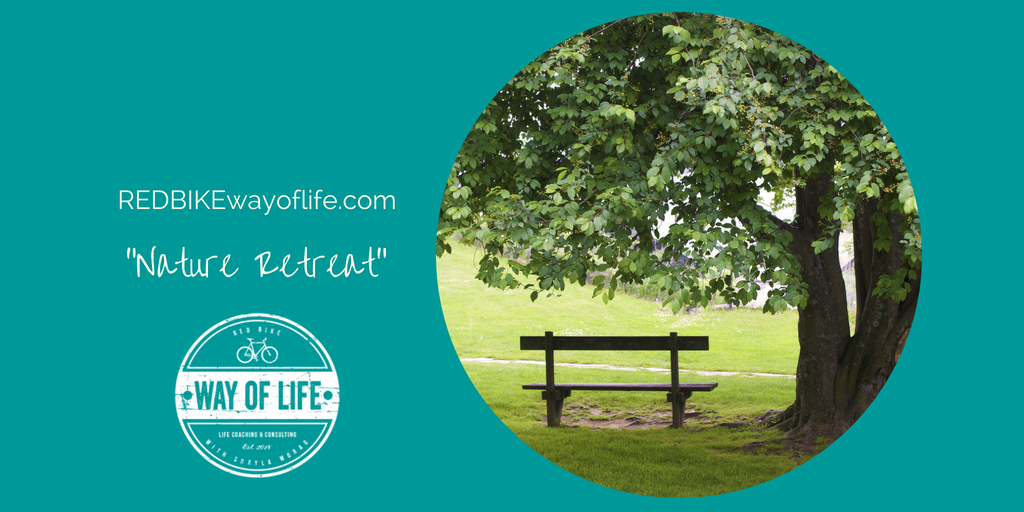
by Shayla Morag | Sep 16, 2019 | Comfort, Handy Tips, Self Care, Sleep, Stress Management, The Red Bike Way
When faced with a bad day, do everything you can to make the most of it. At the very least, avoid making it worse. A bad day doesn’t mean you should just throw in the towel. You only have so many days left, so take full advantage of each one. You can accomplish something worthwhile, no matter how bad of a day you’re experiencing.
Survive a bad day and make the most of it:
1. Avoid behaviors that make a bad day even worse. Complaining, overeating, yelling at a coworker or loved one, or drinking are just a few ways to potentially make a bad day worse. Why throw gasoline on the fire? Keep your wits about you and hold on. Tomorrow is a new day. It might be your best day ever.
2. Maintain your perspective. Maybe your boss hates your report, but it beats the heck out of living under a bridge. No matter how bad your day is, it could be a lot worse. And many are faced with far worse each and every day. Things will get better.
3. Meet with a friend for dinner. People love drama as long as it isn’t their own. Your friend would love to hear about your bad day over a delicious dinner. You can tell your story and unburden yourself, all while enjoying your favorite restaurant.
4. Remember that it’s just one day. You can handle one bad day. You’ve already successfully survived many in the past. Finish the day but look forward to tomorrow. Things can only get better, right?
5. Avoid making any important decisions. A bad day isn’t the best time to decide to quit your job, give up on your dream of law school, or end a relationship. All of those things can wait until your mood and circumstances have normalized. Again, avoid doing anything that can make your crummy day significantly worse.
6. Make plans that excite you. Decide to get away for the weekend or buy that new iPod you’ve been eyeing for the last few months. Give yourself something to look forward to in the near future.
7. Learn a lesson. Is there anything you did to cause your bad day? Could your rough day have been prevented? Can you learn anything from this experience? A rough day isn’t so bad if you learned something useful from it. Make the best of it.
8. Breathe. Unless you’re underwater, breathing is always a good idea to relieve tension and regain control of your emotions. Just breathe and get your work done. Completing everything that needs to be done is more challenging when everything seems to be going wrong, but you’ll feel more satisfied at the end of the day if it wasn’t a complete loss.
9. Take a nap. Sometimes you can reset your day and your brain by taking a quick nap. Maybe you’ll see your situation in a new light. A nap also provides a needed break.
Deal with your bad days effectively. When you’re experiencing a bad day, focus on survival and completing the most important tasks. Most importantly, avoid using a bad day as an excuse to do something stupid or you might find that it can get worse. Follow these strategies and you’ll get through your rough days in the best ways possible.

by Shayla Morag | May 23, 2018 | Change, Comfort, Emotional Intelligence, Freedom, Mindfulness, Self Care, Self-Compassion, The Red Bike Way
There are some people that have no trouble sharing their feelings. They are devoid of the fear and anxiety that most of us feel about sharing something personal or potentially controversial. Down deep, you’re jealous of these people. Openness provides a level of freedom that eludes those that are more private. It’s important to be able to share your feelings and concerns openly.
Your concerns can’t be addressed if you’re unwilling to share them. You have to face your challenges alone if you keep them to yourself.
Share your feelings and enjoy the resulting freedom it provides:
1. Be more accepting of others. It sounds counterintuitive, but if you’re afraid to share your feelings, you may be judgmental of others. Naturally, you would expect others to judge you, too. It’s impossible to accurately judge others. There’s always more going on than you realize. Be accepting of others and you’ll expect others to be accepting of you.
2. Start small. Share something small, but relevant. Once you see that you can share your feelings without negative repercussions, you’ll be more likely to share them again.
3. Determine the source of your fear. You may fear judging, rejection, ridicule, or embarrassment. Perhaps attacking that fear is the first logical step to lessening your anxiety around sharing and openness.
4. Be brave. There’s no way to be 100% comfortable about sharing your feelings until you’ve done it several times. There’s a certain amount of courage required at the beginning. Be brave enough to share your feelings. It becomes easier over time.
5. Encourage others to share their feelings with you. You might feel more comfortable if your conversation partner goes first.
6. Stay in the present moment. You generate feelings of fear by worrying about the possible outcomes. Stay in the moment, and your fear will dissipate. Avoid imagining the worst possible outcome.
7. Calibrate the other person. Others are often careless when they believe something doesn’t matter. You’ll find that others are more empathetic and understanding if you let them know that something is important to you. It can be as simple as, “I want to tell you about something that’s important to me.” Put others in the proper state of mind before you share.
8. Be honest. The willingness to make yourself vulnerable will enhance your results. If you’re sharing something that displeases you about the other person, it’s important to empathize first. Sharing your feelings requires consideration of the other person’s feelings, too.
9. Take a deep breath and just do it. The anticipation is usually worse than the actual event. Sometimes, you just have to go for it. You can do it. Focus on how much better you’ll feel afterwards.
Change isn’t easy. Sharing can be scary, but the benefits outweigh the anxiety experienced. In time, you’ll learn to share your feelings and worries more easily. It just takes practice. Focus on the benefits you’ll receive and let the words flow. The other person will appreciate your effort and you’ll find that you get what you want more often.

by Shayla Morag | May 22, 2018 | Change, Comfort, Grief, Mindfulness, Self Care, Self-Compassion, Stress Management, The Red Bike Way
The complications and ups and downs of modern life can leave you feeling stressed and lonely, but the solution is sometimes surprisingly simple. A recent study found that visiting a park for at least 30 minutes a week significantly reduces the risk of depression. Scientists in Australia found further evidence of what researchers have been saying for years. Connecting with nature enhances your physical, mental, and social well being.
If you want to help prevent depression, check out these handy tips. You’ll find ideas for making the most of your local park, and discover other ways to commune with nature.
Benefits of Parks and Other Natural Settings
1. Increase your happiness. Whether it’s a spectacular waterfall or a simple flower bed, we appreciate the beauty and order in our surroundings.
2. Boost your health. Spending time in parks has been shown to lower high blood pressure and reduce the risk of hypertension and heart disease. Being outdoors can also help you lose weight and sleep well if it increases your physical activity and exposure to morning light.
3. Socialize more. Parks bring together citizens from different walks of life. Whether you’re people watching or flying a kite, you share a positive experience.
Ideas for Using Your Local Park
1. Work out. Today’s parks often offer much more than jogging trails. Look for circuit training stations, softball fields, and tennis courts. Exercise requires less effort when you’re admiring the scenery.
2. Eat lunch. Squeeze a break into your busy schedule by eating lunch outdoors. Packing a bag lunch usually cuts costs and calories compared to most restaurants.
3. Attend events. Check the calendar on your park’s website. You may find free concerts, movies, and family events.
4. Pause to think. Find a comfortable place to sit and breathe.
5. Clean up. Now that you realize how much your park does for you, you may want to give something back. Join volunteer programs that pick up garbage, plant trees, or conduct tours for school children.
More Tips for Enjoying Nature
1. Take a walk. What can you do if there’s no park nearby? Stroll around the neighborhood or a local college campus.
2. Plan your vacation. Go camping or incorporate outdoor activities into any vacation. You can rent bikes or kayaks. Breakfast on the beach or go horseback riding in the mountains.
3. Tend your garden. Growing your own food and flowers is a great way to increase your gratitude for the earth. Plant tomatoes in your back yard or share a community plot.
4. Go for a dip. While green spaces provide impressive benefits, blue spaces may be even more powerful. Spend some time near water. Install a fountain in your back yard or ask a hotel if you can purchase a pool membership. Some facilities offer discounts for local residents.
5. Bring your pet. Observing wild animals is entertaining and educational as long as you take reasonable safety precautions. If you want to interact more closely, walk your dog or play Frisbee together.
6. Gaze at stars. Learn about science the fun way while you stimulate your sense of wonder. Shop for a basic telescope or check the calendar for public programs at community observatories.
7. Redecorate your home. For rainy days, invite the outdoors in. Arrange your furniture so you sit by a window with a view. Set out fresh flowers or pretty seashells.
Talk with your doctor if you’re experiencing symptoms of depression that interfere with your daily life. Otherwise, increasing your exposure to green and blue spaces may be all you need to lift your spirits and stay fit.

by Shayla Morag | May 10, 2018 | Change, Comfort, Emotional Intelligence, Mindfulness, Patience, Persistence, Self Care, Self-Compassion, The Red Bike Way
There are times when we feel we have just had enough. Whether it’s a bad job, a family crisis, or a horrible diet, there are times we all consider quitting. Quitting isn’t always a bad choice. We’ve been taught to believe that quitting is synonymous with failure, but some activities or relationships aren’t worth continuing. It’s important to arrive at a decision to quit or continue consciously, rather than making a reflective decision.
Avoid quitting prematurely:
1. Hit the pause button. Most poor decisions could be avoided by taking a short pause. When you’re stressed, overworked, overtired, and fed-up, rash decisions become the norm. Give yourself the time you need to make a wise decision. Allow your head to clear before you make a decision that changes your life. Most decisions can wait.
2. View the situation objectively. Try to be objective and weigh the situation carefully. Enlist the help of a friend if necessary. It can be easier to evaluate someone else’s situation accurately than your own.
3. Consider the worst-case scenario. Think long-term. Quitting is an easy choice when you only consider the short-term ramifications. You can relieve your stress almost immediately! However, what are the long-term consequences? If you quit your job, what will happen if you can’t find another one?
- Reconsider quitting if the long-term consequences are too severe. A little relief now isn’t worth long-term pain.
- Who will be impacted by your quitting? Your boss? Coworkers? Family? The members of your church softball team? Who is affected?
- What message are you sending to your children? What would you recommend to a child in a similar circumstance? Your children are always watching. Be sure to set a good example.
4. Ask yourself if a new approach is warranted. Maybe you shouldn’t quit. Maybe you need a new plan. Not getting the results you desire isn’t necessarily a sign that you should call it quits. Poor results indicate an ineffective process. Perhaps all you need is a tweak to your approach. Major accomplishments are accompanied by numerous failed attempts.
5. Ask yourself why you’re considering quitting. Is it because you don’t believe you can be successful? You don’t have the resources you require? Do you not enjoy the job, activity, or relationship in question? Are you lacking the necessary time?
- Some reasons for quitting are better than others. Quitting a second job you don’t need so you can spend more time with your children is a good reason to quit. Ending your marriage because your spouse won’t pick up his dirty socks might be a bit extreme.
- Is there another solution besides quitting?
6. Consider the times you’ve given up in the past. How do you feel about those events today? Was quitting a good idea or do you regret it? How are you likely to feel in the future about quitting in your current situation?
7. Sometimes it’s necessary to lower your head and keep going. There are times when quitting is the best choice. However, when it’s not the best choice, it’s necessary to be strong and keep going. Stick with that horrible job until you have something else lined up. Give counseling a try before quitting on another relationship.
- If your default coping mechanism is quitting, you’ll never accomplish anything.
Take a moment before making a hasty decision. Quitting isn’t to be taken lightly. Before making the decision to quit, consider the consequences, consult with a trusted friend, and consider your history. In some instances, quitting is final. Avoid creating long-term challenges to alleviate stress in the short-term. Give yourself the time you require to make a wise decision.

by Shayla Morag | Apr 13, 2018 | Comfort, Creativity, Grief, Music, The Red Bike Way
It can be very helpful to write down our feelings, emotions, and reflections throughout the cycles of grief. It can give perspective, insights, and offer some resolve. Over the years, I have found writing music very therapeutic. I wrote my songs not really thinking of them being played on the radio as grief is a very personal journey. I have always been a believer that emotions will either get expressed, depressed, suppressed, or repressed. They often come out in other ways if not released and honored. Check out this sampling of some of my compositions based on my life experiences.

by Shayla Morag | Mar 27, 2018 | Comfort, Poem, The Red Bike Way, Wise Words
Do not stand at my grave and weep.
I am not there, I do not sleep.
I am a thousand winds that blow,
I am the diamond glints on snow.
I am the sunlight on ripened grain,
I am the gentle autumn’s rain.
When you awaken in the morning’s hush,
I am the swift uplifting rush
of quiet birds in circled flight.
I am the stars that shine at night.
Do not stand at my grave and cry,
I am not there, I did not die…
~ Mary Frye







